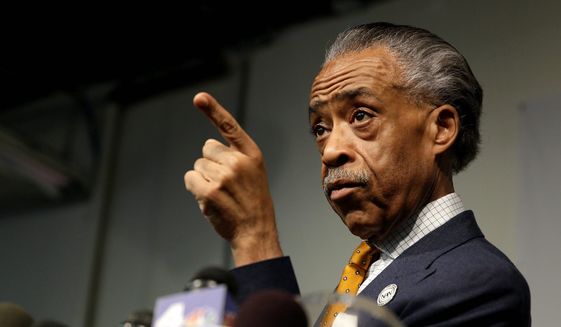Doesn't Sharpton Deserve a Rest?
By Wesley Pruden
WashingtonTimes.com

The terror of Ebola in the
United States has subsided. Maybe it’s too soon to
tell, but it looks like we’re not all dead, after
all. Dispatches from West Africa have vanished from
the front pages. The digital purveyors of news have
gone on to more important catastrophes, such as the
latest celebrity wardrobe malfunctions, feuding
between Whoopi Goldberg and Rosie O’Donnell, and
gays fighting in borrowed hot tubs. The
disappearance of Ebola from the public consciousness
is a tribute not to the power of medical science,
however, but to the power of the press.
The wretches of the press (or the media as we
sometimes call it now) have the attention span of a
3-year-old and this week the flavor of the week is
the terror of Jim Crow, who apparently has returned
to take command of police departments everywhere.
President Obama,
Eric Holder, The Washington Post and The New
York Times have all the breathless details of life
in the rotten society where we all are doomed to
live.
President Obama and the Rev.
Al Sharpton convened a meeting at the
White House Monday to do something about it.
It’s not clear whether the mob at Ferguson, which
mourned the death of
Michael Brown and assuaged its grief by trying
to burn down the town, will now be satisfied with
anything short of lynching Darren Wilson, the police
officer who, in fear of his life, shot young
Mr. Brown — or, as he is invariably identified
in media boilerplate, “the slain 18-year-old unarmed
Michael Brown,” as if Unarmed was his Christian
name. He is rarely identified as “the angry 6-foot
5-inch, 250-pound young man who charged at the
officer.”
Two wrongs do not make a right, and death, to
paraphrase Shakespeare, is an organ with many
mouths. The undisputed details of how the young man
died may never be revealed, which is OK because in
the New Age everyone is entitled not only to his
opinion but to his own facts. If such facts are not
available, make them up.
President Obama wants more money to throw at a
“problem” that is not yet identified in all its grim
particulars. Young
Mr. Brown’s parents think the answer is in “body
cameras” to be worn by policemen, so the president
and his administration wants Congress to spend $263
million to buy 50,000 cameras for the nation’s
police departments. Nothing yet on whether the
program can be expanded to outfit the public with
such cameras, to be worn like seat belts to get the
full picture of confrontations between cops and
mischief-makers.
The president promises that he will discuss with his
Cabinet the “militarization” of local police
departments, and promises to appoint the inevitable
task force to make recommendations to him about how
to redirect the $5.1 billion giveaway in discarded
military gear. “We support the use of cameras and
video technology by law enforcement officers, and
the Department of Justice continues to research best
practices for implementation,” the
White House said in response to a public
petition with 154,000 signatures.
The
White House said it would provide “new training
resources and money to study how to reform police
practices.” Except for the anticipated usual
government waste, this will no doubt be money well
spent. Well-trained policemen are needed and welcome
everywhere.
But somewhere here somebody should say a good word
for teaching impressionable young men (and women) of
whatever color that confronting a policeman,
disobeying his lawful order and trying to take his
gun away from him, is not a good idea. Maybe
Michael Brown didn’t want to walk on the
sidewalk. Maybe he preferred the street. Maybe he
didn’t like the officer’s tone of voice. He was
entitled to his opinion. He was not entitled to do
something about it. Later he could tell it to the
judge.
Perhaps the president could explain this to whoever
needs to hear it. If he’s busy
Eric Holder could do it. Right now they’re busy
instructing white folks how to behave themselves.
But one of them could remind everyone that if
Michael Brown had resisted the urge to confront
and reform the cop, to obey the cop’s lawful order,
to keep his hands (raised or not) to himself he
could have saved his life and saved his parents the
grief of an unspeakable loss that can’t be relieved
no matter how many beauty shops and convenience
stores the mob burns down.
This would be a genuine service to everyone, and the
president and the attorney general could let
Al Sharpton, called to the
White House so often and who has done so much to
so many, get a rest.
• Wesley Pruden is editor emeritus of The Washington Times.

